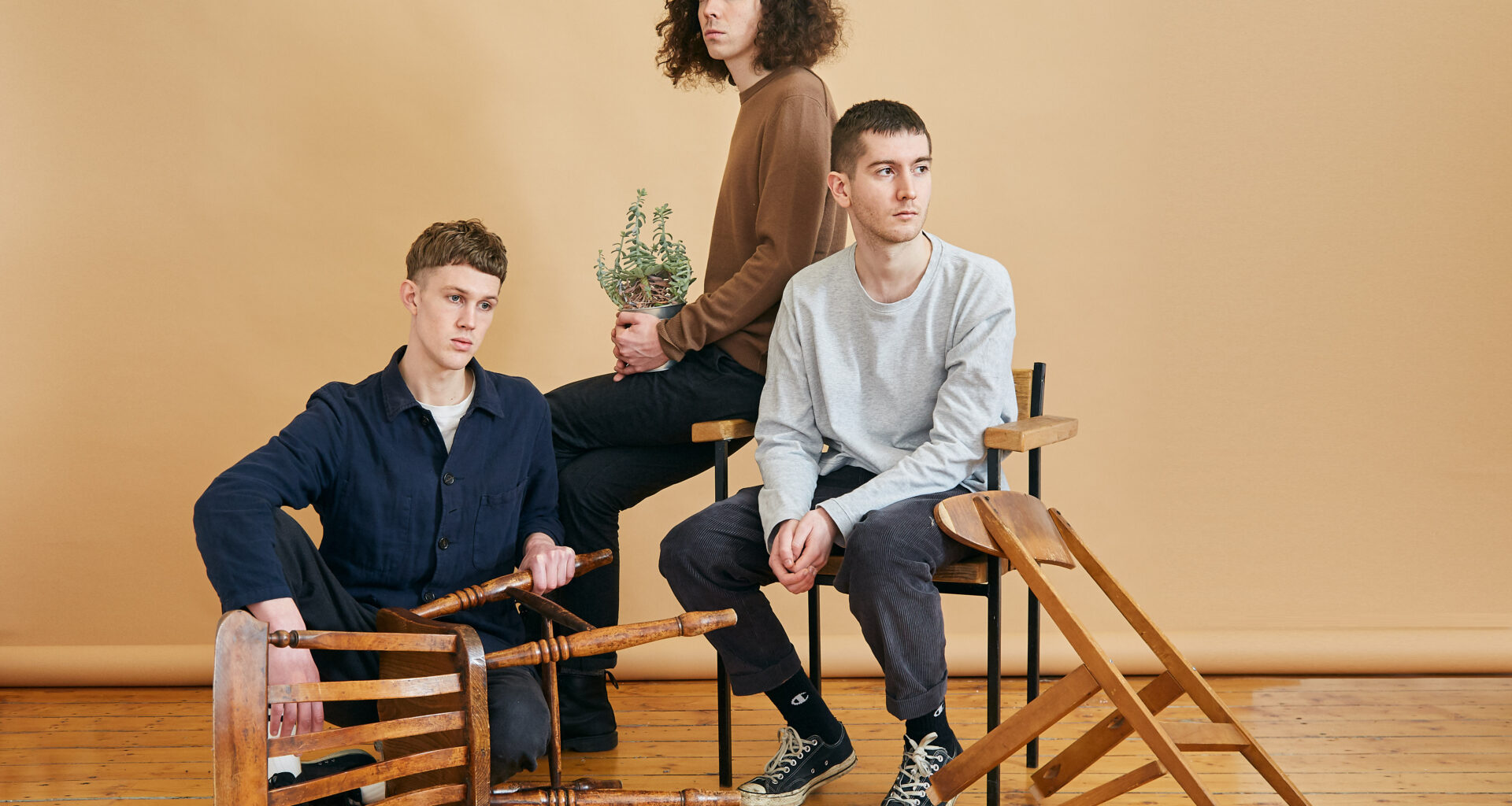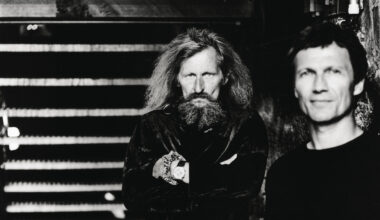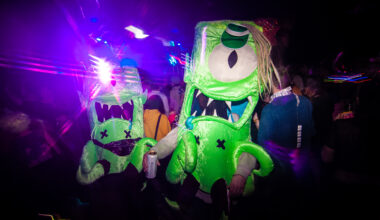Shunning support slots in favour of their own headline shows and a stop-you-in-your-tracks debut album, ‘Incidental Music’, it’s time to sit up and pay attention to Manchester’s WH Lung…
Often when interviewing the more stately artists for Electronic Sound, it takes a long lens to remember the old times – back to the rave days, the nascent rise of sampling, the splicing of reels. For the three young lads in front of me, they’re so early in their career, remembering the old times is just a glance over their shoulder. You catch us in an old Manchester mill remembering their experiments with rock music at university a few short years ago.
“We were very guitar,” remembers Tom S. “There weren’t any electronic elements: it was quite traditional.”
“And purposefully so,” adds the other Tom, Tom P. “We would avoid synths from a naive need to protect the rawness of the music.”
Let me introduce WH Lung, a synthesiser band currently blazing a trail with a debut album lauded by critics as “modern maximalist psychedelia” and an “electro-gliding beauty”. ‘Incidental Music’ is a modern take on 1970s wig-outs, by way of David Byrne, first-album Verve and the spirit of Jack Kerouac. While guitars are strewn all over their sound, it would be difficult to imagine their music without the Moroder/Carpenter stylings of their synths – listen to those basslines buzz.
It’s worth pointing out that we’re in no ordinary Manchester mill. We find ourselves amid the industrial brickwork of the International Anthony Burgess Foundation, a live venue dedicated to a man who knew a thing or two about the scourge of youth. This was also the site of WH Lung’s first-ever gig in 2017, a show that attracted local press and music moguls. It lit a touch paper for the trio, partly because they chose to launch their career not with a support slot, but with a bona fide headline gig.
“We made a decision that we weren’t going to play a support slot – and we still haven’t,” says singer Joseph E, the only band member not called Tom. “We wanted to have our first gig in a venue of our choosing.”
“I remember practising in Leeds at midnight, then driving back here,” says Tom S about the lead-up to the gig. “We had to cram in rehearsals so we didn’t have time to panic.”
This is not a road to Damascus story where Robert Moog appears in a flash of light to teach a bunch of guitarheads about keyboards. Although if that has happened to you, get in touch and we’ll do a feature about it.
“It was a gradual process,” says Joseph E. “It wasn’t just a case of, ‘Sit down guys, now it’s synth time’.”
This is, however, a tale of guys brought together through dissatisfaction. Joseph E was old friends with Tom P, but while Joseph E was busy being a student in Leeds, Tom P was attending university in London barely keeping his financial head above water. So Joseph E linked up with the other Tom, fellow student Tom S. With his bank account empty, Tom P soon headed up to the more financially temperate Leeds and they all tried their best to become the next Black Rebel Motorcycle Club. The whole thing nearly didn’t last for Joseph E, who wanted to be an actor. It was a snap decision that saved the band.
“The week before I was meant to go to drama school,” he says, “I decided it would be boring, so instead I made some terrible songs with these two.”
And they were terrible, mostly. They hunkered down and wrote a song a day, writing on the fly, but somewhat stymied by an uncooperative drummer who they eventually replaced with an Alesis drum machine.
“He didn’t like playing motorik rhythms, so we sacked him and moved to Manchester,” says Tom P. Which is some dissatisfaction. But the move was when WH Lung were born – when they allowed machines to become band members. Sharing the burden with technology helped lighten the load, says Tom P, because “writing an eight-minute song on a Tuesday night after an eight-hour shift is just difficult.”
They hooked up with Leeds producer Matt Peel, whose converted church studio The Nave is full of analogue and modular delights. He’s an old friend of the Kaiser Chiefs, and has helmed albums for Pulled Apart By Horses, Eagulls and now WH Lung. Adding Matt’s gear gave them the ability to play around with sounds more efficiently, and provided an electronic beatsmith who will never run out of motivation.
“The equipment was what we needed,” says Tom P. “We were able to make something that had a lot of space. As a result, it became impossible to write anything under five minutes!”
Album track ‘Inspiration!’ is the only tune to survive these early writing sessions: the piece was their first step away from angular noughties rock towards something more kraut-crafted. ‘Nothing Is’ was their second WH Lung track, and its shimmering, three-minute beatless introduction became a statement about their new commitment to synthesised sound.
“That ambient intro showed the kind of guidance we had from Matt Peel,” says Joseph E. Meanwhile, the band was devouring Cluster’s 1976 album ‘Sowiesoso’ alongside works by Can, Neu! and, of course, Brian Eno.
“And we were also writing with the computer,” says Tom S, “which is something we hadn’t done before.”
These two tracks, released as a double 10-inch single in 2017, were tentative forays into building a debut album, with the Manchester-based threesome taking any chance they could to pop over the Pennines to the Leeds studio to lay down something new.
“Matt had superior equipment to us,” says Tom P. “We now have a house full of synths.”

Sometimes songs arrived fully formed, and sometimes they threw ideas over an arpeggiator to see where the creativity took them. And all the while, Peel’s guiding hand was an instrumental force – you can thank him for that oh-so-eighties Korg Mono/Poly that was added last-minute on ‘Second Death Of My Face’ – the chorus of which, incidentally, was composed by Joseph E while improvising on the piano in Manchester Central Library.
“It was quite fun because we didn’t really know what we were doing,” says Tom S. “With the old guitar band set up, we were more comfortable, maybe in a bad way. Whereas with this, we were learning something new.”
Joseph and the two Toms slowly built up a collection of studio experiments, very much written for the record and not for the stage.
“When we came to Manchester, we had an idea of the direction of songs, but we wouldn’t have been able to play them live,” says Joseph E. “We were writing all these parts that couldn’t exist in the real world.”
So gigging became a challenge, but it was something the band was in no hurry to fix. In fact, they shifted their focus to concentrate solely on writing, and had no qualms about locking themselves away instead of throwing themselves into the support band circuit.
“There’s a culture around new bands that it’s a bad idea to refuse a gig on any basis,” says Tom P. “Before WH Lung, I’d had two years of subscribing to that and it not paying off.”
That renewed focus also translates into a healthy stubbornness which shows in the interview – they refuse to reveal virtually anything solid about their pre-Lung life. I know one of them from some years ago, and when I make a reference to the past, he flattens me with a steely glare. And of course there’s also the initials E, P and S, which you, the patient reader, have been putting up with throughout this article. Their surnames remain a closely guarded secret. I know them, but I can feel the band staring me down, so I won’t reveal them here.
“There was an early live review where someone tried so hard to find our names,” says Joseph E. “They got most of the band right. If bands want to be anonymous, the press has a need to find out who they are – so you’re exposing yourself even more, and that wasn’t the intention.”
Keeping the press at bay has indeed been difficult. Manchester has a scattered history of bands cloaking themselves in anonymity, the most notorious of which was Wu Lyf, a short-lived outfit with Satanic stylings that fleetingly attracted the attention of Jay Z. Wu Lyf had the support of a design agency that could find a hundred Photoshopped ways to mask the group’s identity. In contrast, in their early anonymous photo shoots, WH Lung simply put plastic bags over their heads.
“The real WH Lung actually perform behind a curtain,” jokes Joseph E. “Our original aesthetic was to resist the urge to reveal everything of ourselves: we wanted to just focus on writing really good music.”
“The press attention is all very hyperbolic,” says Tom P. “The word ‘enigmatic’ comes up a lot.”
I can tell you some of their secrets. When he was younger, Tom S had Harold Shipman as his GP. Tom P once had a drink with a disagreeable Shia LaBeouf, and Joseph E once met Brooklyn Beckham in a Wendy house.
“What’s a Wendy house?” asks Tom P.
“It’s a house,” says Joseph E, “where you have a little play.”
Tom P looks genuinely bemused as we sit around a table in the Burgess Foundation on a quiet Sunday. The curtains are wide open this afternoon, with Manchester’s concrete-grey skies streaming in through the windows. The space feels much airier than that first gig in 2017, the hot intimacy of which created an instant public buzz. One online fan declared it “all shades of intoxicating”, and they quickly caught the ear of radio DJ Huw Stephens, who playlisted them for the BBC.
After that debut performance, they tore the roof off a psychedelia festival in Liverpool, then traversed the fields of Cheshire to take on Bluedot’s galactic-themed tents. They’re an ideal fit for Bluedot, which has hosted Hookworms, Mercury Rev, The Flaming Lips, and Orbital jamming with the Radiophonic Workshop. It was their first outdoor festival slot, and Tom S calls it “a bit of a wake-up call”.
“The stage was huge,” says Joseph E, recalling the comical layout. “They put one synth at one end and the other synth at the other end. We didn’t get the sound right and I couldn’t hear anything. We felt we had less control – we knew we could do better.”
“Luckily, Bluedot gave us a half-hour set which, for us, is just three songs,” adds Tom P.
And although their gig tally remains relatively minimal, the band now has a super-dedicated sound guy and a live drummer who gets what they do. As you read this, they will have recently finished a short debut tour that will have taken them from Southampton to Glasgow. They also have more Leeds studio time booked in early summer, after which anything could happen. They already feel they are moving on from their Cluster and Can influences, and readily admit to not listening to those bands much anymore.
“Nobody listens exclusively to one genre anymore, do they?” says Tom P, who also cites Thelonious Monk, Kanye West and Prince as influences. “Cues for our music can come from anything: it’s less about style and more about ideas. For example, Julia Holter’s last record was very structurally interesting: it took a lot from jazz.”
Our time in the home of Anthony Burgess is coming to an end: there’s a young men’s choir arriving soon for rehearsals. It’s been good to meet on the site where it all began. Our conversation finishes with loose chatter about the WH Lung cash-and-carry from which they snaffled their name. It’s less than a 20-minute walk from where we’re sat – amazing dumplings, according to Trip Advisor. All of what we say is unprintable, and so it shall remain unprinted. This most private and determined of young bands would surely approve.
‘Incidental Music’ is out on Melodic






